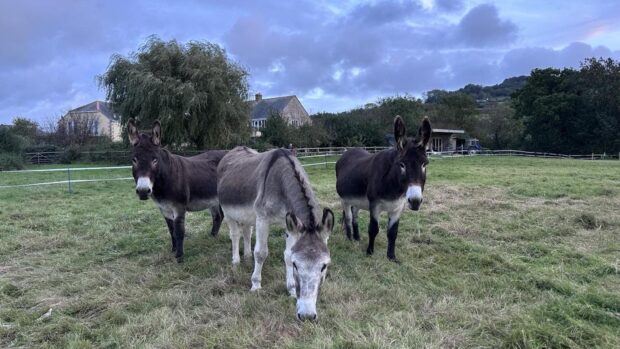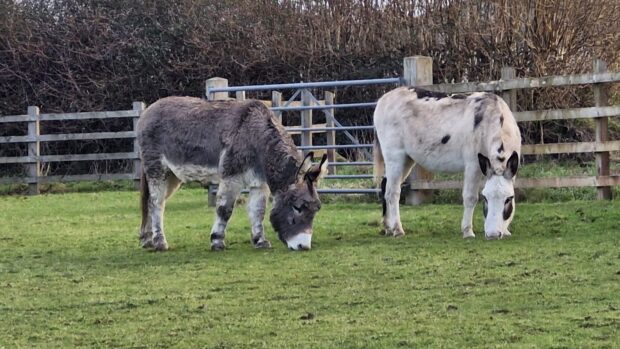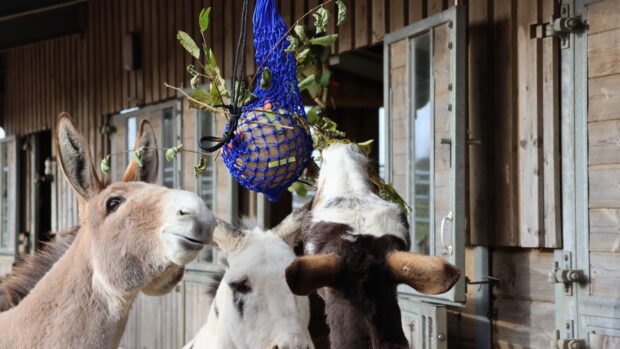More than 100 donkeys have been rescued from being slaughtered for their skin thanks to the intervention of charities fighting to stop this illegal trade.
The National Council of Societies for the Prevention of Cruelty to Animals (NSPCA), the Mooi River SPCA and international animal welfare charity the Donkey Sanctuary joined forces to help intercept a convoy of trucks headed from the Mooi River region in KwaZulu-Natal to the border with Lesotho.
The donkeys, including young foals, were thought to be en route to Lesotho from South Africa.
There, they were likely to be slaughtered for their skins which would be used for production of the traditional Chinese medicine, ejiao.
The animals were found to be suffering with severe infections, open wounds and some even had ears missing. Many of the animals were malnourished and were also infested with ticks.
This apparent resurgence in the donkey skin trade came after nearly 18 months of inactivity, Marcelle Meredith, executive director of the NSPCA said.
“The NSCPA began investigating the donkey skin trade over five years ago when large numbers of unexplained donkey skins were found across multiple farms,” she said.
“The manner in which donkey skins are obtained is gut-wrenching — starting from the way the animals are handled, transported, butchered and sometimes even skinned alive.”
Officers from the South African Police Service (SAPS) arrested six suspects travelling with the donkeys for having no passports of their own or legal travel permits for the animals, and on suspicion of animal cruelty.
All six have since been charged and found guilty of animal cruelty and of living in South Africa illegally.
Around 36 female donkeys and their foals were sent to the Kloof and Highway SPCA facility near Durban, while the remaining donkeys were taken into the care of the Johannesburg SPCA, who will look after them until they can be rehomed.
The Donkey Sanctuary was able to support the NSPCA with funding for the transportation costs.
Simon Pope, tactical response lead for the Donkey Sanctuary, said: “The NSPCA works incredibly hard to combat the illegal skin trade in South Africa.
“This rescue of donkeys destined for slaughter is inspirational. So too is the devotion and care now being given to these hard-working animals.”
Gelatine found in donkey hides is a key ingredient in producing ejiao but dwindling supplies of donkeys in China means traders in Africa and elsewhere are exporting additional skins to meet demand.
Continues below…

‘It’s just boiled donkey skin’: Chinese health officials rubbish ‘inhumane’ product
Demand for ejiao, derived from donkey hides, has led to the slaughter of millions of donkeys

Sickening pictures of dead and dying donkeys show skin trade has spread *warning, upsetting pictures*
‘What I saw happening is inhumane and sickening and we believe this is just the tip of the iceberg’

Subscribe to Horse & Hound magazine today – and enjoy unlimited website access all year round
The lucrative trade has led to widespread poaching and donkey theft in communities which often depend on the animals for their livelihoods.
Grace de Lange, senior inspector from NSPCA’s farm animal protection unit, said that authorities in South Africa also needed to play a part in halting the trade.
“Other countries in the region, such as Botswana, Ethiopia and Senegal have taken action and we are calling for immediate government intervention to stop the export from South Africa of donkeys, as well as their skins or by products for any trade whatsoever,” she said.
Horse & Hound magazine, out every Thursday, is packed with all the latest news and reports, as well as interviews, specials, nostalgia, vet and training advice. Find how you can enjoy the magazine delivered to your door every week, plus options to upgrade to access our H&H Plus online service which brings you breaking news as it happens as well as other benefits.




